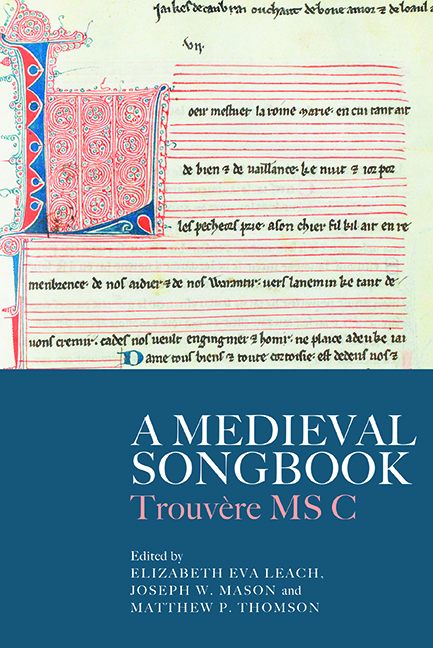Book contents
- Frontmatter
- Contents
- List of Illustrations
- List of Music Examples
- List of Tables
- List of Contributors
- Acknowledgements
- Abbreviations
- Editorial Practices
- Introduction
- Chapter 1 The Trouvère Manuscripts of the Burgerbibliothek Bern
- Chapter 2 The Lorraine Repertoire of C
- Chapter 3 Chansonnier C: Contents, Stemmatic Position, Particularities
- Chapter 4 A Note on the Decoration of C and its Artistic Context
- Chapter 5 Author Ascriptions and Genre Labels in C
- Chapter 6 Common Exemplars of U and C
- Chapter 7 Shared Small Sources for Two Early Fourteenth-Century Metz Chansonniers?
- Chapter 8 The Legacy of Thibaut de Champagne in C
- Chapter 9 Strategies of Appropriation in Jacques de Cambrai's Devotional Contrafacts
- Chapter 10 Jeux-Partis and their Contrafacts in C
- Chapter 11 C and Polyphonic Motets: Exemplars, Adaptations, and Scribal Priorities
- Appendix: List of Songs in C
- Bibliography
- Index of Sources
- Index of Songs
- General Index
- Studies in Medieval and Renaissance Music
Chapter 2 - The Lorraine Repertoire of C
Published online by Cambridge University Press: 26 May 2022
- Frontmatter
- Contents
- List of Illustrations
- List of Music Examples
- List of Tables
- List of Contributors
- Acknowledgements
- Abbreviations
- Editorial Practices
- Introduction
- Chapter 1 The Trouvère Manuscripts of the Burgerbibliothek Bern
- Chapter 2 The Lorraine Repertoire of C
- Chapter 3 Chansonnier C: Contents, Stemmatic Position, Particularities
- Chapter 4 A Note on the Decoration of C and its Artistic Context
- Chapter 5 Author Ascriptions and Genre Labels in C
- Chapter 6 Common Exemplars of U and C
- Chapter 7 Shared Small Sources for Two Early Fourteenth-Century Metz Chansonniers?
- Chapter 8 The Legacy of Thibaut de Champagne in C
- Chapter 9 Strategies of Appropriation in Jacques de Cambrai's Devotional Contrafacts
- Chapter 10 Jeux-Partis and their Contrafacts in C
- Chapter 11 C and Polyphonic Motets: Exemplars, Adaptations, and Scribal Priorities
- Appendix: List of Songs in C
- Bibliography
- Index of Sources
- Index of Songs
- General Index
- Studies in Medieval and Renaissance Music
Summary
Manuscript C, along with chansonniers I and U, is one of the main sources of lyric works from Lorraine dating from the thirteenth and the beginning of the fourteenth centuries. Without C, many of the names of trouvères from Lorraine, along with certain songs, particularly the unica in this manuscript, would be completely unknown today. In many ways, C gives quite a faithful representation of the lyric production of Lorraine. Firstly, almost all of the names of the trouvères that are identified as being from Lorraine appear in this manuscript: the Duchesse de Lorraine, Aubertin des Arvols, Anchise de Moivrons, Jean le Taboureur de Metz, Gautier d’Espinal, Garnier d’Arches, and Simars de Boncourt. Only Jacques d’Epinal and the Comte de Bar are missing. Secondly, it contains most of the songs that have been attributed to the trouvères thus far identified as having come from this region, and thirdly, it reveals their favourite genres: grand chant and devotional songs. This chapter focuses exclusively on the songs in C that are attributed to trouvères identified as being from Lorraine, with questionable identifications and attributions being addressed as required. Details of these songs are presented in the appendix to this chapter.
Studying the repertoire of the Lorraine trouvères through their works in C involves two major difficulties. The first is the identification of the trouvères’ names, which were added by a rubricator after the songs were copied. For the purposes of this chapter it is important to determine if the names refer to writers known for certain to be from Lorraine. The second difficulty concerns the accuracy of the authorial attributions, which is directly linked to these same rubrics. This chapter will thus aim to delimit the Lorraine repertoire in C in order to understand the place given to it in this manuscript. Specifically, I will show that the Lorraine origins of the manuscript privileged the Lorraine repertoire, an indication that people from the region were interested in their own heritage. From this perspective, I will simultaneously consider the geographic origins of the trouvères named by the rubricator of C and whether or not these names, which sometimes appear only in this manuscript, are legitimate, since the existence of these writers and the works attributed to them have often been called into question.
- Type
- Chapter
- Information
- A Medieval SongbookTrouvère MS C, pp. 20 - 43Publisher: Boydell & BrewerPrint publication year: 2022
- 1
- Cited by



